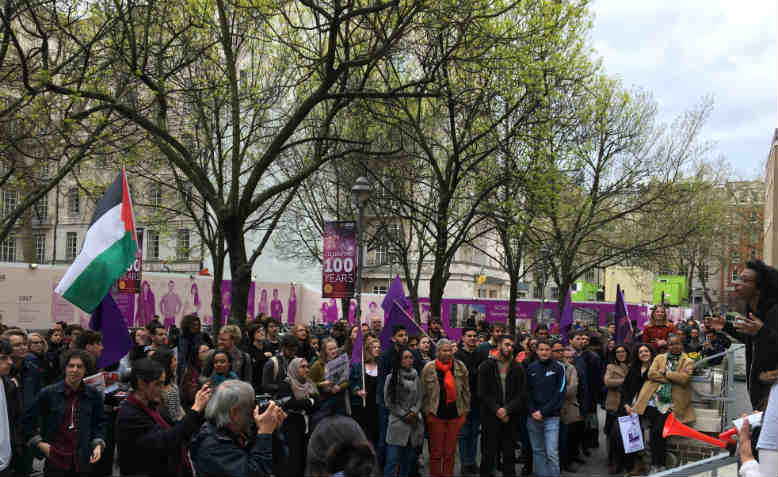 SOAS cleaners, staff and students gather to pressure management. Photo: Feyzi Ismail
SOAS cleaners, staff and students gather to pressure management. Photo: Feyzi Ismail
SOAS ramps up its campaign to bring the cleaning staff in-house, in a struggle that has received national attention
At the precise moment university management were negotiating a new contract with a private company to run the cleaning operation, SOAS students, staff, activists, trade unionists, and the cleaners themselves came together for a huge protest.
Their chants of ‘No Justice, no peace’ and ‘In-house now’ reverberated across the campus on Monday. They were addressed by a wide range of guest speakers including Owen Jones, activist Camalia Naiker from the #feesmustfall campaign in South Africa and Luqman Onikosi, a Sussex student threatened by deportation.
Consuelo Moreno, a lead organiser for the Justice for Cleaners campaign and herself a cleaner, said ‘SOAS, you are out of excuses. The cleaners want to be brought in-house now.’
Celsabil Hadj-Cherif, a SOAS student, explained the passion behind the protest: ‘It’s a matter of justice. We learn so much from this institution but it’s hypocritical to educate yourself about bringing down injustice when the cleaners are oppressed all around you.’
The demand is simple: bring the cleaners in-house. Outsourcing companies have had complete disregard for the working conditions of cleaners, many of whom have been mistreated. For example, in 2009, ISS – the cleaners’ previous employer – secretly invited border agency staff onto campus, called a meeting of cleaners and forcibly deported a number of them.
Will Sheret, co-chair of the SOAS Labour Society said, ‘An attack on one is an attack on all… bringing the cleaners in-house will increase job and financial security. There is absolutely no reason why we shouldn’t bring the cleaners in-house. So it’s clearly an ideological thing and this should be challenged.’
In 2012, when a referendum was held at SOAS as to whether the cleaners should be brought in-house, 98.4% voted in favour. Labour Leader Jeremy Corbyn and Shadow Chancellor John McDonnell have also been supporters of the Justice for Cleaners campaign.
Yet SOAS management has ignored the overwhelming support from students, lecturers and others beyond SOAS. This has created real anger with management, and trust is rapidly eroding. Moreover, a recent independent report costing the price of bringing the cleaners in-house, found that it was approximately £2 million cheaper.
The 10-year struggle has tackled the bullying and mistreatment meted out to cleaners by running a vibrant and creative campaign. They have won the London Living Wage and, later, sick pay, holiday pay and pensions. They have inspired campaigns across the country.
Meera Sabaratnam, a lecturer in politics, said, ‘Bringing cleaners in-house is the only way to guarantee respect and dignity, because we’re all responsible for it.’
A victory will inspire outsourced workers in other universities and beyond to campaign against privatisation. And it may very well be won. Despite the new contract being signed today, there will be further negotiations on 21 April. It’s clear that this is a campaign that won’t be silenced.

